|
Shadow of a doubt (1943) Screenplay:Thornton Wilder, Alma Hitchcock., from the novel by Gordon McDonell.
CAST: Teresa Wright, Joseph Cotten, Macdonald Carey, Henry Travers,Hume Cronyn, 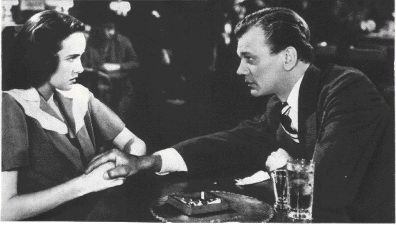
Teresa Wright and Joseph Cotten (Charlie and Uncle Charlie) PLOT: The film concerns Charlie Oakley (Cotten) who is strongly suspected of murdering a number of rich widows. He seeks sanctuary with his sister and niece, also called Charlie (Wright) in the small town of Santa Rosa.Everyone loves Uncle Charlie, afriendly word for everyone, nothing but praise for his siter's cooking, and a fund of anecdotes for the family. It is by small, obsessive detail that gradually his niece develops her own suspicions of the uncle she adores,and was named after. Charlie is also friendly with a detective(Carey) who also entertains a 'shadow ofa doubt' about the amiable Uncle Charlie. Slowly,Uncle Charlie grows aware of his niece's suspicions and twice tries to kill her, lest she reveals her doubts and betrays him. His attempts fails and in his last, he himself falls in front of an oncoming train.
The girl keeps the secret to herself as Santa Rosa turns out to pay tribute to the memory of good old Uncle Charlie. 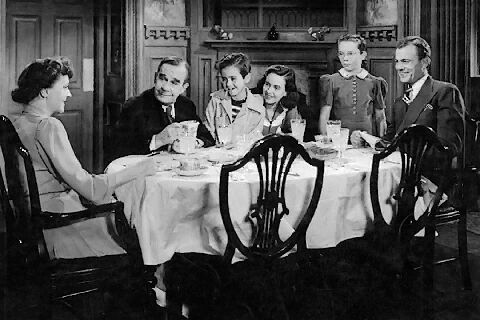
Patricia Collinge, Henry Travers, Teresa Wright, Joseph Cotten. 
Teresa Wright, Joseph Cotten, Henry Travers 
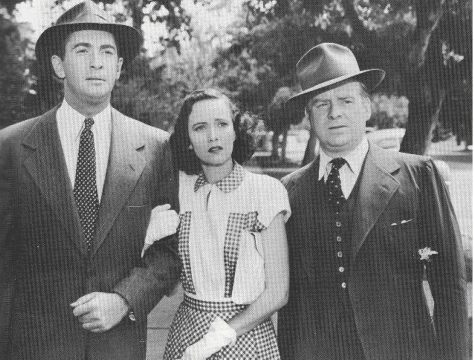
Macdonald Carey, Teresa Wright,

|
| Joseph Cotten, Teresa Wright |
Bon Voyage (1944) A short film undertook for the British Ministry of Information (MOI)
CAST: The Moliere Players( a group of French actors working with with the Free French in exile in London) 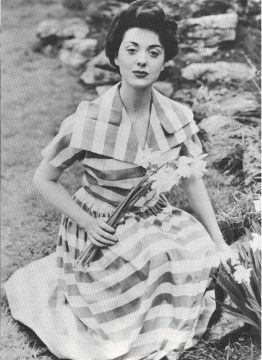
PLOT:
The work of the French Resistence and how they abetted the escape of a shot-down RAF pilot. Spellbound(1945) Screenplay: Angus MacPhail, Ben Hetch, from the novel " The House of Doctor Edwardes" by Francis Beeding
CAST: Gregory Peck, Ingrid Bergman,Leo G. Carroll, Michael Chekhov, Rhonda Fleming 
PLOT:
Dr Constance Peterson (Bergman) doctor at a mental home falls in love with the institution new head, (Peck), She eventually discovers that Peck is an amnesiac who has assumed the identity of the real doctor, whom he believes he has murdered. She is convinced he is innocent and forces him to undergo psychoanalysis, which reveals that he has always felt responsible for the accidental death of his brother and, recently witnessed the death of Dr Edwardes, which left him feeling equally guilty. However Dr.Edwardes' death was not an accident, but cold blooded murder, ironically committed by the long-standing head of the asylum Dr. Murchison (Carroll) who was about to be replaced by Edwardes. The film ends happily with Bergman unmasking the real murderer and departing for a life of guilt-free bliss with the cured Peck. , . 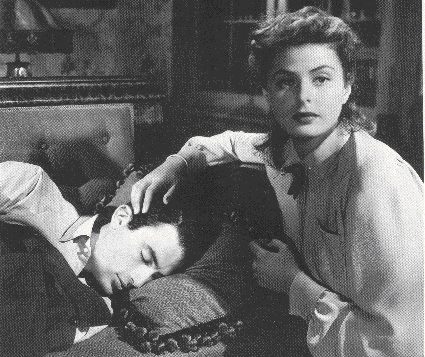

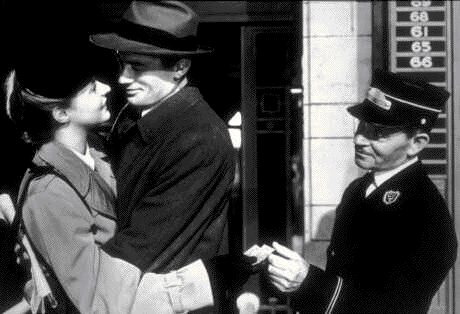
|  |
Lifeboat (1944) Screenplay: Alma Hitchcock based on a short story by John Steinbeck.
CAST: Tallulah Bankhead, John Hodiak, Walter Slezak, William Bendix, Hume Cronyn, Heather Angel,Henry Hull, Canada Lee, Mary Anderson 
Walter Slezak, John Hodiak,Hume Cronyn, William Bendix, Heather Angel, Tallulah Bankhead PLOT:
The story concern the survivors of a torpedoed merchant ship and their struggle for survival on a lifeboat. The survivors fill up the lifeboat, a few members of the crew, an army nurse, a fashion writer and a millionaire. They then pick up one of the crew of the U-Boat which torpedoed them and was itself sunk. Gradually,thanks to superior seamanship, the Nazi assumes command of the boat and is secretely steering it toward a German supply ship. The wounded seamen discovers his plan and is killed by the Nazi. The remaining survivors guess that the crewman's death was not suicide and kill the Nazi before being rescued by an Allied vessel at the last minute. 
William Bendix reading the paper carrying Hitchcock's cleverest CAMEO role. 
The whole film was remarkably unlike Hitchcock's other work. it was the opportunity to study various types of people under pressure. The film's message was a statement telling the democracies to put their differences aside and to gather their forces to concentrate on the common enemy, whose strength was precisely derived from a spirit of unity and determination (typified by Slezak in the movie, precise, callous,determined and methodical, he is the most responsible character aboard) It was Slezak's portrayal which saw the film run into criticism, the critic missing completly the message. In any case, even with the good acting of all the cast, the film belongs to Bankhead as the fashion writer in what remains arguably her finest film role. 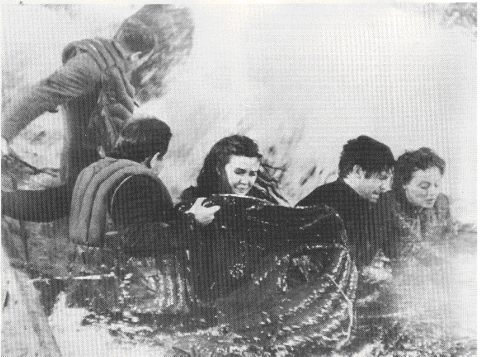
Alfred Hitchcock was nominated for Best Director by the Academy of Art and Sciences for his piece of bravura, but lost (as he always will ), this time to Leo McCarey for 'Going my way' 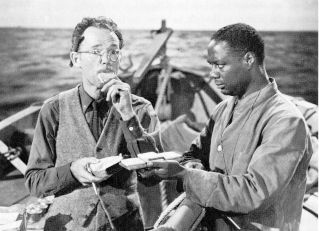
Henry Hull, Canada Lee

|
| Hume Cronyn, Heather Angels, John Hodiak, William Bendix |
Adventure Malagache(1944) Second Short made for the MOI at request by Hitchcock's friend Sidney Bernstein
CAST:
The Moliere Players 
PLOT: The short concentrates on the division within the Free French forces during the time leading up to Liberation. A Painful Reminder
realized 1944/45
Released 1985 on British TV Hitchcock's most potentially significant Propaganda effort lay unseen in the vaults of the Imperial War Museum in London for 40 years: Five reels of film which showed the horrifying truth about the Nazi death camps.
Bernstein had ordered a Ministry of Information film crew into Belsen three days after Liberation to film the monstruous aftermath of the Holocaust. When the full horror of this one camp was revealed, Bernstein accumulated hundred of thousands of feet of film from the other 5000 camps. To assure the authenticity of the footage Bernstein engaged Colin Willis of the "News Chronicle" and Richard Crossman to work on a script, Solly Zuckerman as Scientific and Medical Advisor, and Hitchcock to direct and edit objectively the material. Hitchcock sent out instructions to the cameramen to ensure authenticity.
The cameramen had to take long tracking shots so they could not be interfered with. The use of panning and tracking shots, depicting the mounds of boies, with no cuts to prove that there had been no technical trickery, and that these awful images were undeniably real. He cut from the mound of unidentifiable bodies to the easily recognizable corpulent figures of local dignitaries in order to emphasize the idea of collective guilt and so on.
Hitchcock spent five harrowing months working on the most awful footage imaginable to produce just under an hour of film. The result was deemed too terrifying to be screened.
Hitchcock himself remained deeply upset about the footage and never spoke openly about it. The idea had been to show it to the citizens in Germany to prove how foul the Nazi regime had been and to remind the Allied audiences just what they had spent six long years fighting against. But such was the harrowing impact of the assembled footage that it was shelved and not screened until it was shown on British television in 1985 iunder the title " A Painful reminder" On this occasion the original commentary script was recorded for the first time and Bernstein's memories were ineterspersed with the footage. 

To fully visualize the hero's tormented dreams, Hitchcock asked Salvator Dali to collaborate on the sequence. The two worked magnifically together and to this day the dream sequences retain their power to disturb and unsettle, exactly the effect Hitchccock was looking for.
Leo G Carroll, was here in a rare villainous role.
Altogether he appeared in six Hitchcock films, more than any other actor (although he is still probably best remembered today for his work as mr Waverley in the 1960s TV serial "The man from UNCLE"
Bergman, already a star and Peck at the beginning of his career gave good, sensitive performances.
The film earned an Academy Award Nomination for Best Picture, Best Director for Hitchcock and Best supporting actor for Michael Chekhov. 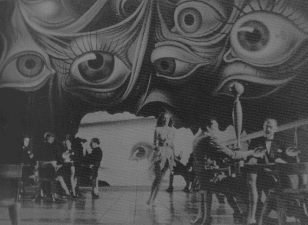
Dali's Surreal set for Spellbound dream sequence (the girl at the center is Rhonda Fleming) 

|

